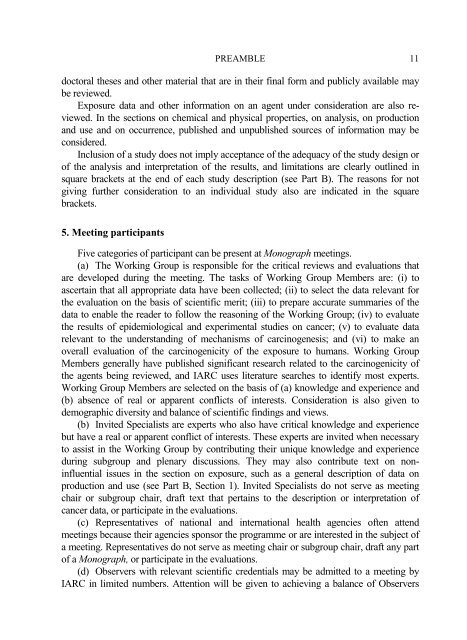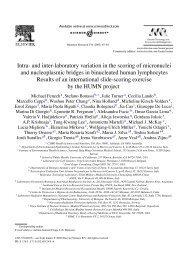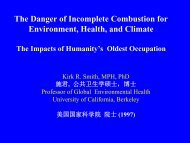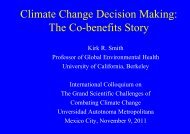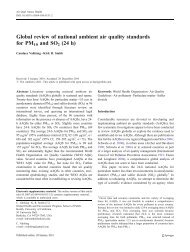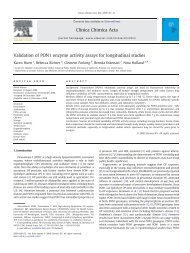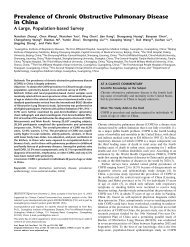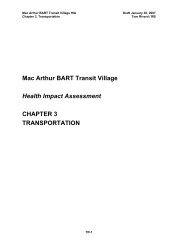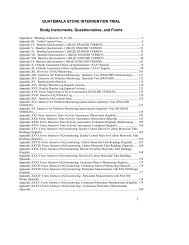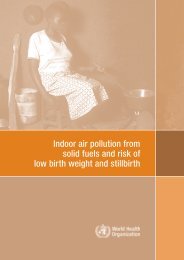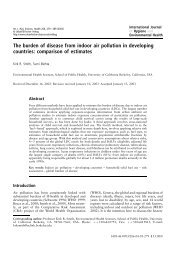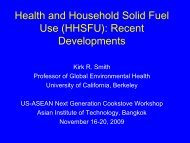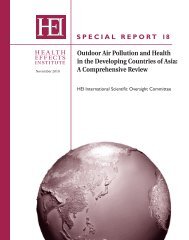- Page 1: WORLD HEALTH ORGANIZATION INTERNATI
- Page 4 and 5: IARC MONOGRAPHS In 1969, the Intern
- Page 7 and 8: CONTENTS NOTE TO THE READER .......
- Page 9: CONTENTS vii 3. Studies of Cancer i
- Page 13 and 14: IARC MONOGRAPHS ON THE EVALUATION O
- Page 15: PARTICIPANTS 5 Invited Specialist M
- Page 18 and 19: 8 IARC MONOGRAPHS VOLUME 95 IARC wa
- Page 22 and 23: 12 IARC MONOGRAPHS VOLUME 95 from c
- Page 24 and 25: 14 IARC MONOGRAPHS VOLUME 95 on its
- Page 26 and 27: 16 IARC MONOGRAPHS VOLUME 95 presen
- Page 28 and 29: 18 IARC MONOGRAPHS VOLUME 95 in coh
- Page 30 and 31: 20 IARC MONOGRAPHS VOLUME 95 differ
- Page 32 and 33: 22 IARC MONOGRAPHS VOLUME 95 unders
- Page 34 and 35: 24 IARC MONOGRAPHS VOLUME 95 which
- Page 36 and 37: 26 IARC MONOGRAPHS VOLUME 95 aneupl
- Page 38 and 39: 28 IARC MONOGRAPHS VOLUME 95 the si
- Page 40 and 41: 30 IARC MONOGRAPHS VOLUME 95 these
- Page 42 and 43: 32 IARC MONOGRAPHS VOLUME 95 For co
- Page 44 and 45: 34 IARC MONOGRAPHS VOLUME 95 studie
- Page 46 and 47: 36 IARC MONOGRAPHS VOLUME 95 Sherma
- Page 48 and 49: 38 IARC MONOGRAPHS VOLUME 95 The ad
- Page 51 and 52: HOUSEHOLD USE OF SOLID FUELS 1. Exp
- Page 53 and 54: HOUSEHOLD USE OF SOLID FUELS 43 sto
- Page 55 and 56: HOUSEHOLD USE OF SOLID FUELS 45 Tab
- Page 57 and 58: HOUSEHOLD USE OF SOLID FUELS 47 Fig
- Page 59 and 60: HOUSEHOLD USE OF SOLID FUELS 49 beg
- Page 61 and 62: (b) HOUSEHOLD USE OF SOLID FUELS 51
- Page 63 and 64: HOUSEHOLD USE OF SOLID FUELS 53 for
- Page 65 and 66: HOUSEHOLD USE OF SOLID FUELS 55 Tab
- Page 67 and 68: HOUSEHOLD USE OF SOLID FUELS 57 Tab
- Page 69 and 70: HOUSEHOLD USE OF SOLID FUELS 59 com
- Page 71 and 72:
HOUSEHOLD USE OF SOLID FUELS 61 How
- Page 73 and 74:
HOUSEHOLD USE OF SOLID FUELS 63 Tab
- Page 75 and 76:
HOUSEHOLD USE OF SOLID FUELS 65 Tab
- Page 77 and 78:
HOUSEHOLD USE OF SOLID FUELS 67 typ
- Page 79 and 80:
HOUSEHOLD USE OF SOLID FUELS 69 by
- Page 81 and 82:
HOUSEHOLD USE OF SOLID FUELS 71 the
- Page 83 and 84:
HOUSEHOLD USE OF SOLID FUELS 73 the
- Page 85 and 86:
HOUSEHOLD USE OF SOLID FUELS 75 wit
- Page 87 and 88:
HOUSEHOLD USE OF SOLID FUELS 77 Tab
- Page 89 and 90:
HOUSEHOLD USE OF SOLID FUELS 79 Rec
- Page 91 and 92:
HOUSEHOLD USE OF SOLID FUELS 81 Tab
- Page 93 and 94:
HOUSEHOLD USE OF SOLID FUELS 83 Tab
- Page 95 and 96:
HOUSEHOLD USE OF SOLID FUELS 85 use
- Page 97 and 98:
HOUSEHOLD USE OF SOLID FUELS 87 Tab
- Page 99 and 100:
HOUSEHOLD USE OF SOLID FUELS 89 Tab
- Page 101 and 102:
HOUSEHOLD USE OF SOLID FUELS 91 Tab
- Page 103 and 104:
HOUSEHOLD USE OF SOLID FUELS 93 hou
- Page 105 and 106:
HOUSEHOLD USE OF SOLID FUELS 95 of
- Page 107 and 108:
HOUSEHOLD USE OF SOLID FUELS 97 als
- Page 109 and 110:
HOUSEHOLD USE OF SOLID FUELS 99 Tab
- Page 111 and 112:
HOUSEHOLD USE OF SOLID FUELS 101 Ta
- Page 113 and 114:
HOUSEHOLD USE OF SOLID FUELS 103 Ar
- Page 115 and 116:
HOUSEHOLD USE OF SOLID FUELS 105 ex
- Page 117 and 118:
HOUSEHOLD USE OF SOLID FUELS 107 Ta
- Page 119 and 120:
HOUSEHOLD USE OF SOLID FUELS 109 Ta
- Page 121 and 122:
HOUSEHOLD USE OF SOLID FUELS 111 Ta
- Page 123 and 124:
HOUSEHOLD USE OF SOLID FUELS 113 st
- Page 125 and 126:
HOUSEHOLD USE OF SOLID FUELS 115 Ta
- Page 127 and 128:
HOUSEHOLD USE OF SOLID FUELS 117 Ta
- Page 129 and 130:
HOUSEHOLD USE OF SOLID FUELS 119 ra
- Page 131 and 132:
HOUSEHOLD USE OF SOLID FUELS 121 Ta
- Page 133 and 134:
HOUSEHOLD USE OF SOLID FUELS 123 Ta
- Page 135 and 136:
HOUSEHOLD USE OF SOLID FUELS 125 Ta
- Page 137 and 138:
HOUSEHOLD USE OF SOLID FUELS 127 Al
- Page 139 and 140:
HOUSEHOLD USE OF SOLID FUELS 129 Da
- Page 141 and 142:
HOUSEHOLD USE OF SOLID FUELS 131 IA
- Page 143 and 144:
HOUSEHOLD USE OF SOLID FUELS 133 Na
- Page 145 and 146:
HOUSEHOLD USE OF SOLID FUELS 135 Sa
- Page 147 and 148:
HOUSEHOLD USE OF SOLID FUELS 137 Wa
- Page 149 and 150:
HOUSEHOLD USE OF SOLID FUELS 139 Zh
- Page 151 and 152:
HOUSEHOLD USE OF SOLID FUELS 141 Ta
- Page 153 and 154:
HOUSEHOLD USE OF SOLID FUELS 143 Ta
- Page 155 and 156:
HOUSEHOLD USE OF SOLID FUELS 145 Ta
- Page 157 and 158:
HOUSEHOLD USE OF SOLID FUELS 147 Ta
- Page 159 and 160:
HOUSEHOLD USE OF SOLID FUELS 149 Ta
- Page 161 and 162:
HOUSEHOLD USE OF SOLID FUELS 151 Ta
- Page 163 and 164:
HOUSEHOLD USE OF SOLID FUELS 153 Ta
- Page 165 and 166:
HOUSEHOLD USE OF SOLID FUELS 155 st
- Page 167 and 168:
HOUSEHOLD USE OF SOLID FUELS 157 An
- Page 169 and 170:
HOUSEHOLD USE OF SOLID FUELS 159 wa
- Page 171 and 172:
HOUSEHOLD USE OF SOLID FUELS 161 Ta
- Page 173 and 174:
HOUSEHOLD USE OF SOLID FUELS 163 Ta
- Page 175 and 176:
HOUSEHOLD USE OF SOLID FUELS 165 fr
- Page 177 and 178:
HOUSEHOLD USE OF SOLID FUELS 167 Ta
- Page 179 and 180:
HOUSEHOLD USE OF SOLID FUELS 169 th
- Page 181 and 182:
HOUSEHOLD USE OF SOLID FUELS 171 2.
- Page 183 and 184:
HOUSEHOLD USE OF SOLID FUELS 173 Ta
- Page 185 and 186:
HOUSEHOLD USE OF SOLID FUELS 175 Ta
- Page 187 and 188:
HOUSEHOLD USE OF SOLID FUELS 177 Ta
- Page 189 and 190:
HOUSEHOLD USE OF SOLID FUELS 179 Ta
- Page 191 and 192:
HOUSEHOLD USE OF SOLID FUELS 181 Ta
- Page 193 and 194:
HOUSEHOLD USE OF SOLID FUELS 183 In
- Page 195 and 196:
HOUSEHOLD USE OF SOLID FUELS 185 In
- Page 197 and 198:
HOUSEHOLD USE OF SOLID FUELS 187 Ta
- Page 199 and 200:
HOUSEHOLD USE OF SOLID FUELS 189 2.
- Page 201 and 202:
HOUSEHOLD USE OF SOLID FUELS 191 Ta
- Page 203 and 204:
HOUSEHOLD USE OF SOLID FUELS 193 in
- Page 205 and 206:
HOUSEHOLD USE OF SOLID FUELS 195 A
- Page 207 and 208:
HOUSEHOLD USE OF SOLID FUELS 197 ex
- Page 209 and 210:
HOUSEHOLD USE OF SOLID FUELS 199 Ta
- Page 211 and 212:
HOUSEHOLD USE OF SOLID FUELS 201 Ta
- Page 213 and 214:
HOUSEHOLD USE OF SOLID FUELS 203 Pi
- Page 215 and 216:
HOUSEHOLD USE OF SOLID FUELS 205 st
- Page 217 and 218:
HOUSEHOLD USE OF SOLID FUELS 207 Ta
- Page 219 and 220:
HOUSEHOLD USE OF SOLID FUELS 209 Ta
- Page 221 and 222:
HOUSEHOLD USE OF SOLID FUELS 211 Ta
- Page 223 and 224:
HOUSEHOLD USE OF SOLID FUELS 213 th
- Page 225 and 226:
HOUSEHOLD USE OF SOLID FUELS 215 ho
- Page 227 and 228:
HOUSEHOLD USE OF SOLID FUELS 217 Ch
- Page 229 and 230:
HOUSEHOLD USE OF SOLID FUELS 219 Mz
- Page 231 and 232:
HOUSEHOLD USE OF SOLID FUELS 221 3.
- Page 233 and 234:
HOUSEHOLD USE OF SOLID FUELS 223 12
- Page 235 and 236:
HOUSEHOLD USE OF SOLID FUELS 225 Ve
- Page 237 and 238:
HOUSEHOLD USE OF SOLID FUELS 227 6
- Page 239 and 240:
HOUSEHOLD USE OF SOLID FUELS 229 In
- Page 241 and 242:
HOUSEHOLD USE OF SOLID FUELS 231 Kh
- Page 243 and 244:
HOUSEHOLD USE OF SOLID FUELS 233 on
- Page 245 and 246:
HOUSEHOLD USE OF SOLID FUELS 235 av
- Page 247 and 248:
HOUSEHOLD USE OF SOLID FUELS 237 re
- Page 249 and 250:
HOUSEHOLD USE OF SOLID FUELS 239 ly
- Page 251 and 252:
HOUSEHOLD USE OF SOLID FUELS 241 co
- Page 253 and 254:
HOUSEHOLD USE OF SOLID FUELS 243 ba
- Page 255 and 256:
HOUSEHOLD USE OF SOLID FUELS 245 Re
- Page 257 and 258:
HOUSEHOLD USE OF SOLID FUELS 247 ma
- Page 259 and 260:
HOUSEHOLD USE OF SOLID FUELS 249 so
- Page 261 and 262:
HOUSEHOLD USE OF SOLID FUELS 251 Di
- Page 263 and 264:
HOUSEHOLD USE OF SOLID FUELS 253 ma
- Page 265 and 266:
HOUSEHOLD USE OF SOLID FUELS 255 20
- Page 267 and 268:
4.2.3 Genetic and related effects (
- Page 269 and 270:
HOUSEHOLD USE OF SOLID FUELS 259 (5
- Page 271 and 272:
P53 protein accumulation Coal and w
- Page 273 and 274:
HOUSEHOLD USE OF SOLID FUELS 263 co
- Page 275 and 276:
HOUSEHOLD USE OF SOLID FUELS 265 Ta
- Page 277 and 278:
HOUSEHOLD USE OF SOLID FUELS 267 Ta
- Page 279 and 280:
HOUSEHOLD USE OF SOLID FUELS 269 Ta
- Page 281 and 282:
HOUSEHOLD USE OF SOLID FUELS 271 Ta
- Page 283 and 284:
HOUSEHOLD USE OF SOLID FUELS 273 co
- Page 285 and 286:
HOUSEHOLD USE OF SOLID FUELS 275 1.
- Page 287 and 288:
HOUSEHOLD USE OF SOLID FUELS 277 Ta
- Page 289 and 290:
HOUSEHOLD USE OF SOLID FUELS 279 Ho
- Page 291 and 292:
HOUSEHOLD USE OF SOLID FUELS 281 Ca
- Page 293 and 294:
HOUSEHOLD USE OF SOLID FUELS 283 Fl
- Page 295 and 296:
HOUSEHOLD USE OF SOLID FUELS 285 ed
- Page 297 and 298:
HOUSEHOLD USE OF SOLID FUELS 287 Ma
- Page 299 and 300:
HOUSEHOLD USE OF SOLID FUELS 289 Ne
- Page 301 and 302:
HOUSEHOLD USE OF SOLID FUELS 291 Re
- Page 303 and 304:
HOUSEHOLD USE OF SOLID FUELS 293 Va
- Page 305 and 306:
HOUSEHOLD USE OF SOLID FUELS 295 5.
- Page 307 and 308:
5.2 Human carcinogenicity data 5.2.
- Page 309 and 310:
HOUSEHOLD USE OF SOLID FUELS 299 in
- Page 311 and 312:
HOUSEHOLD USE OF SOLID FUELS 301 pr
- Page 313:
HOUSEHOLD USE OF SOLID FUELS 303 6.
- Page 316 and 317:
306 IARC MONOGRAPHS VOLUME 95 the i
- Page 318 and 319:
308 IARC MONOGRAPHS VOLUME 95 Table
- Page 320 and 321:
310 IARC MONOGRAPHS VOLUME 95 A stu
- Page 322 and 323:
312 IARC MONOGRAPHS VOLUME 95 which
- Page 324 and 325:
314 IARC MONOGRAPHS VOLUME 95 Wei S
- Page 326 and 327:
316 IARC MONOGRAPHS VOLUME 95 gener
- Page 328 and 329:
318 IARC MONOGRAPHS VOLUME 95 [Beca
- Page 330 and 331:
320 IARC MONOGRAPHS VOLUME 95 domes
- Page 332 and 333:
322 IARC MONOGRAPHS VOLUME 95 Table
- Page 334 and 335:
324 IARC MONOGRAPHS VOLUME 95 Table
- Page 336 and 337:
326 IARC MONOGRAPHS VOLUME 95 Table
- Page 338 and 339:
328 IARC MONOGRAPHS VOLUME 95 Fulla
- Page 340 and 341:
330 IARC MONOGRAPHS VOLUME 95 Walla
- Page 342 and 343:
332 IARC MONOGRAPHS VOLUME 95 Table
- Page 344 and 345:
334 IARC MONOGRAPHS VOLUME 95 Table
- Page 346 and 347:
336 IARC MONOGRAPHS VOLUME 95 1996)
- Page 348 and 349:
338 IARC MONOGRAPHS VOLUME 95 Table
- Page 350 and 351:
340 IARC MONOGRAPHS VOLUME 95 Table
- Page 352 and 353:
342 IARC MONOGRAPHS VOLUME 95 Table
- Page 354 and 355:
344 IARC MONOGRAPHS VOLUME 95 Table
- Page 356 and 357:
346 IARC MONOGRAPHS VOLUME 95 Table
- Page 358 and 359:
348 IARC MONOGRAPHS VOLUME 95 Table
- Page 360 and 361:
350 IARC MONOGRAPHS VOLUME 95 Table
- Page 362 and 363:
352 IARC MONOGRAPHS VOLUME 95 Table
- Page 364 and 365:
354 IARC MONOGRAPHS VOLUME 95 Table
- Page 366 and 367:
356 IARC MONOGRAPHS VOLUME 95 (adju
- Page 368 and 369:
358 IARC MONOGRAPHS VOLUME 95 (adju
- Page 370 and 371:
360 IARC MONOGRAPHS VOLUME 95 Compa
- Page 372 and 373:
362 IARC MONOGRAPHS VOLUME 95 heati
- Page 374 and 375:
364 IARC MONOGRAPHS VOLUME 95 addit
- Page 376 and 377:
366 IARC MONOGRAPHS VOLUME 95 Chine
- Page 378 and 379:
368 IARC MONOGRAPHS VOLUME 95 3. St
- Page 380 and 381:
370 IARC MONOGRAPHS VOLUME 95 4.1 T
- Page 382 and 383:
372 IARC MONOGRAPHS VOLUME 95 intra
- Page 384 and 385:
374 IARC MONOGRAPHS VOLUME 95 Pu et
- Page 386 and 387:
376 IARC MONOGRAPHS VOLUME 95 Table
- Page 388 and 389:
378 IARC MONOGRAPHS VOLUME 95 Table
- Page 390 and 391:
380 IARC MONOGRAPHS VOLUME 95 Glase
- Page 392 and 393:
382 IARC MONOGRAPHS VOLUME 95 Zhang
- Page 394 and 395:
384 IARC MONOGRAPHS VOLUME 95 frequ
- Page 396 and 397:
386 IARC MONOGRAPHS VOLUME 95 6. Ev
- Page 399 and 400:
LIST OF ABBREVIATIONS ABC adenosine
- Page 401 and 402:
CUMULATIVE CROSS INDEX TO IARC MONO
- Page 403 and 404:
CUMULATIVE INDEX 393 Angelicin plus
- Page 405 and 406:
CUMULATIVE INDEX 395 Benzoyl peroxi
- Page 407 and 408:
CUMULATIVE INDEX 397 Captan 30, 295
- Page 409 and 410:
CUMULATIVE INDEX 399 Chrysene 3, 15
- Page 411 and 412:
CUMULATIVE INDEX 401 Deoxynivalenol
- Page 413 and 414:
CUMULATIVE INDEX 403 Diglycidyl res
- Page 415 and 416:
CUMULATIVE INDEX 405 Ethyl tellurac
- Page 417 and 418:
CUMULATIVE INDEX 407 Hexachlorobuta
- Page 419 and 420:
CUMULATIVE INDEX 409 Lead oxide (se
- Page 421 and 422:
CUMULATIVE INDEX 411 Methyl iodide
- Page 423 and 424:
CUMULATIVE INDEX 413 3-Nitrofluoran
- Page 425 and 426:
CUMULATIVE INDEX 415 Oestrogens, pr
- Page 427 and 428:
CUMULATIVE INDEX 417 Ponceau MX 8,
- Page 429 and 430:
CUMULATIVE INDEX 419 Senkirkine 10,
- Page 431 and 432:
CUMULATIVE INDEX 421 1,1,1,2-Tetrac
- Page 433 and 434:
CUMULATIVE INDEX 423 Tris(2-methyl-
- Page 435 and 436:
List of IARC Monographs on the Eval
- Page 437 and 438:
Volume 57 Occupational Exposures of


